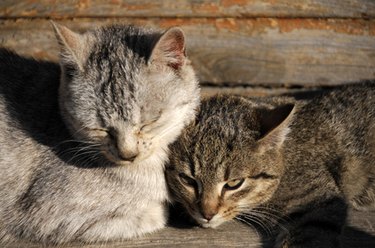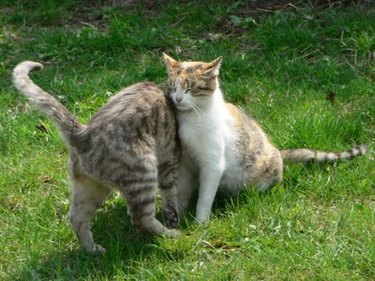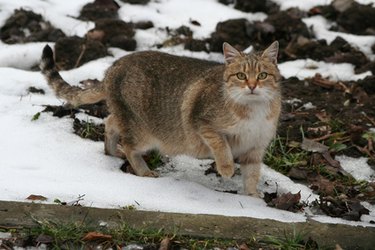Cats display a wide range of personality traits and behaviors, and no two are exactly alike. However, there are some behavioral traits that are common among female cats. A few of these traits are related to whether or not a cat is spayed, while others will depend on whether your cat is an only child or has other feline roommates. Seasonal and hormonal changes can also have an effect on a female cat's behavior.

Video of the Day
Hormonal changes that affect behavior
A female cat who is not spayed will go into heat. Heat is a part of a cat's reproductive cycle (called the estrous cycle in females) and happens in sexually mature cats when they are ready to mate. Female cats experience their first heat around 6 months of age, and they will go into heat throughout their life unless they are spayed.
Video of the Day
Cats are seasonally polyestrus, meaning they can have multiple heats (or cycles) during their breeding season. In cats, the breeding season is usually from around February to October, when the weather is warmer and daylight hours are longer. However, indoor cats who live in comfortable conditions year-round can come into heat all year long.
Once a cat's estrus cycle begins, she can go into heat every two to three weeks. Cat in heat behavior will change considerably. The most common sign of a cat in heat is increased vocalization; she will meow and yowl loudly, which serves the purpose of attracting a mate. Female cats in heat can also become more clingy and affectionate. They urinate more frequently, and an increase in pheromones can make their urine more odorous. They may also mark or spray while in heat.
Pregnancy and behavioral changes
A pregnant female cat may exhibit behavioral changes. She will spend more time resting and napping and may prefer to spend more time indoors if she usually has outdoor privileges. Some female cats become more affectionate with their humans during pregnancy but may be more standoffish to other cats in the household. Toward the end of their pregnancy, female cats can become restless and might wander around the house or start meowing and yowling more often.
Can female cats get along?
Female cats may behave differently in households with other cats. This will largely depend on the sex of the cats and whether they are spayed or neutered. Cats who are not spayed or neutered are less likely to get along, as their seasonal hormonal spikes can lead to fighting.

Some cats may become dominant over others in a multicat household. This is sometimes referred to as "alpha behavior," but cats do not have a linear social hierarchy with an alpha at the top. Both female and male cats can display dominant behavior, which includes growling, hissing, spraying, and stiff body language toward other cats.
There's no real evidence that a cat's sex determines how well he or she gets along with other cats. Two spayed female cats can get along just fine but are more likely to be friendly with one another if they have compatible personalities and energy levels.
Male vs. female cat personalities

There is very little research on girl vs. boy cat personalities, but there is plenty of firsthand reporting from cat parents. Cat owners may find that their boy cat is more playful and affectionate, while their girl cat is more independent. Males can be more rambunctious and may be more prone to late-night zoomies than females.
The personality differences between male and female cats are more obvious in unaltered cats. Males who are not neutered can be territorial and aggressive and are more likely to roam or try to escape the house. Females who are not spayed can be more clingy and affectionate and are very vocal.
- BondVet: When Do Cats Go Into Heat?
- American Veterinary Medical Association: Spaying and Neutering
- Senior Cat Wellness: How Do Cats Show Dominance to Other Cats?
- International Cat Care: Adding an Additional Cat
- Viera East Veterinary Center: How to Spot the Personality Differences Between Male and Female Cats
- MedicAnimal: Understanding the Signs and Stages of Pregnancy and Advice on Caring for Your Pregnant Queen
- Burgess: Girls v Boys – Feline Myths and Misconceptions
- "The Complete Guide to Holistic Cat Care: An Illustrated Handbook"; Jean Hofve; 2009